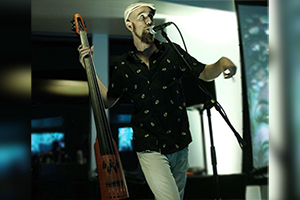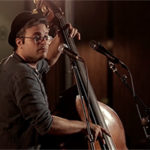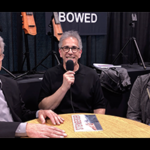Dream Upright bassist talks about his journey from metal guitarist to upright bassist
Exclusive interview with FBPO’s Jon Liebman
January 11, 2021
Danny Pritchett has been a performer most of his life. The California native began acting at the age of 6, and even made an appearance in the Arnold Schwarzenegger film Jingle All the Way. He got into music big time as a teenager, eventually making a splash on the L.A. rock scene in the early 2000s as guitarist and front man of the metal band Diminished. At the tail end of that decade, he switched gears and began playing the upright bass. His embrace of bass led him in a new direction, both sonically and professionally, and he began to work with artists like Luv Amp Project and The Love Mob, as well as organizations like Microsoft. In 2015, Pritchett launched his current project Dream Upright, which combines elements of music, magic, and comedy.
FBPO: You’ve got quite an interesting background, with TV shows, commercials, movies… How did you become a bass player?
Pritchett: I started doing child acting and stuff when I was younger. Around the age of 13, I got the music bug, like we all get, thankfully. I was really into rock and roll, really into Metallica, so I learned all the Metallica songs, and started a band the first day. Our band was called Lollipop, because we sucked.
FBPO: Were you playing bass right away, from the beginning?
Pritchett: I wasn’t on bass right away, I was on a rhythm guitar and vocals, front man for a while. Yeah, it was weird, we were really getting into polyrhythms, really getting into syncopation, things like that. And we started writing our original songs right away. We got a lucky break pretty soon. We got notice of this guy who owns The Whiskey and the Rainbow Roxie, so we were playing the Whiskey three or four times a month, almost every week pretty much, and I was 14.
FBPO: You were playing those places when you were only 14 years old?
Pritchett: Yeah, I was 14. Well, this is about a year after writing songs. So we were working hard, like every Sunday was church, music day for us. We were in the garage, hardcore, eight hours, writing songs, working on structure, a lot of songs, really getting fascinated. Metallica was one of our main influences, and you know, they write such epic songs, especially the older stuff.
FBPO: This was in LA? Is that where you grew up?
Pritchett: Yeah. I grew up in Burbank, and then Los Angeles. So around 14, we were lucky, started selling out The Whiskey. Our manager was backing us up. We almost got signed to Atlantic Records. There’s a funny story about that. We did a showcase for them, and we had these big executive guys fly down, and we were 14 years old and rocking out. We didn’t care. They were trying to make us a little bit more poppy, and we were resisting that. We used to throw Twinkies out at people at our shows for fun. I ended up hitting one of the record executive guys. I don’t think they liked that too much. We ended up not cutting a deal with them, with Atlantic.
FBPO: Was the Twinkie wrapped or unwrapped?
Pritchett: It was wrapped and it had our website on it.
FBPO: That’s good marketing.
Pritchett: We were wild. We were crazy back then. I mean it was definitely a lot of intensity, not what I’m doing these days for sure. But it was fun. And yeah, we toured a little bit, got to tour with the band Static-X for a while. And played lots of shows, played hundreds of shows with them, and just rocked out a lot around the Roxie, Whiskey, Knitting Factory, a lot of the L.A. stuff.
FBPO: You were still playing rhythm guitar at that point?
Pritchett: Yeah, I was playing rhythm guitar and lead vocals. We recorded over 60 songs. Did a couple tracks with Ulrich Wild, who produced Alice In Chains, and Powerman 5000, Rob Zombie. We got a couple close breaks but never really broke through. And then our main guitar player, the co-writer of mine, this guy Paulo, he ended up wanting to be a lawyer, so we were like, “Bye-bye.” We got a new guitar player, and then we ended up being in a major motion picture called Reign Over Me, with Don Cheadle, Adam Sandler. If you look in that movie, there’s a scene where Adam Sandler’s in a band, he’s in a metal band, and that’s us. We’re all playing, I’m screaming, I had long hair. We had a song about zombies that we wrote.
FBPO: How did you gravitate to the bass?
Pritchett: I was doing the music stuff for a while, and I took a small break, and I was listening to a lot of, I guess technically the genre would be like Spy Lounge. It’s like electronica with jazz fusion stuff. And I loved the upright bass. I was like, “What is up with this upright bass tone?” That tone really got my attention. And then I found this bass player later on, you might have heard of him, named Adam Ben Ezra.
FBPO: Sure, I know Adam.
Pritchett: Yeah, good friend too, amazing Israeli bass player. So he was another main influence for me. And I listened to a lot of Bobby McFerrin at that time. I love his vocals. He’s one of my main vocal influences. So I got into looping. I ended up purchasing an upright bass in 2007. And then I met up with a good friend of mine, Tony Moss, who was doing a lot of amazing ceremonial work, and a lot of Native American music, and stuff like that, working with plant medicine. I started playing in ceremonies, and I started playing music that was really heartfelt. And I had an amazing experience one night. We were in a ceremony and I had my upright bass. And I was just supporting and hanging out and learning the upright, and someone wasn’t feeling so good, and he was like, “Hey, why don’t you go play over this person?” And they were laying down, we were giving them some healing energy at that point. And I had this epiphany moment where I realized that my bass is a healing implement. And it was a huge shift in my perspective of playing, where I was less involved in playing for entertainment and the ego and wanting to be successful. I was more playing for I want to tune this person up and bring more harmony and frequency to the world and the planet. That really was a big shift in the way that I perform and the way that I approach playing. And yeah, that was a huge thing for me.
FBPO: Tell me about Dream Upright.
Pritchett: Dream Upright is something I started around 2014. Basically, Dream Upright is my solo project, which I’m still doing right now. It’s a one-man band, essentially. Everything is all vocals and upright bass only.
FBPO: That’s why you like Adam Ben Ezra.
Pritchett: Yeah, totally! I love looping. I think looping has got so much potential, and I feel like we’re going to see a lot of future talent coming out of the looping world. I don’t know if you’ve explored looping yourself, but it’s so much fun, and there’s so much possibility. And it’s cool because it helps me think a lot about negative space in music, which I really love. I feel like a lot of musicians don’t acknowledge rest and silence enough, especially bass. Pausing. The next time you come in, the next hit is that much bigger. And the bass, like we know, is like a pulse, like the human heart. It’s the rhythm, it’s the life force of the music, which (is) of the reasons why I love playing bass.
FBPO: Do you play much electric bass too, or mostly upright?
Pritchett: I’m really attracted to the upright. I do play electric a little bit. I love to jam on some Jamiroquai or play some funk or some older stuff. But I really am attracted to the limitlessness of the upright, the intonation, the possibilities of minor notes, microtonal notes, in-between spaces. I love Indian music as well, and I do a lot of sound bath, and a lot of stuff with drones. And bow. Bow work is so beautiful to me. You can’t really play the bow on an electric. And I’m lucky to be working with NS. I’m so in love with my NS bass.
FBPO: Tell me more about your gear.
Pritchett: Yeah, of course. Right now I’m using a MarkBass amp, and for my loop pedal I’ve been primarily using the Boss RC300. And for my bass, nothing else than my NS upright bass. I love it so much.
FBPO: Which model is your NS Design bass? Is it the CR5?
Pritchett: Yes, I have the CR5, yep. I got the five-string because I wanted that extra low B, and I’m so glad I have that because I do a lot of session work for studios, and having the low B is beautiful. And then it gives you an extra C on the first fret. You just get that bottom end like nothing else. It’s just so huge. The sustain in the NS bass. Ned Steinberger is such a genius. I love them so much, and I’ve been really blessed. Corey (Redonnett, NS Design Artist Relations Manager) and everyone at artist relations have been really fantastic. And yeah, they set me up with that bass. I’ve been in love with it, I’ve taken it on planes, I’ve flown to Costa Rica, all over the world with it. The sustain on that thing too is just phenomenal.
FBPO: What kind of strings do you play on it?
Pritchett: I’m using the stock strings that they have. I’m exploring some other string options, some hybrid stuff, but I’ve been just keeping it with what they’ve had on there. They’re using the D’Addario stuff. Yeah, it’s just so much fun. And I loved using the bow too. I’ve really been getting into bow work a lot more.
FBPO: What advice can you give to somebody who wants to learn bass?
Pritchett: Totally, that’s a great question. I would recommend, honestly, visiting For Bass Players Only. I was checking it out, and I’m like I want to learn some stuff off this. Me personally, my road to music has been very informal. I’ve mostly been trained by ear. I did some education. And I’ve taken some classes to help me with session work of course, because learning how to read will get you further. But I’m honestly still a “feel” player. I’m probably going to be taking some lessons off your website as well because I feel like it’s another tool to have in our tool case of options to be creative.
FBPO: Thank you, I appreciate that. What else can you share about what’s important to do the job of a bass player?
Pritchett: I think using a metronome would be a fantastic way to get going. Some people are resistant to metronomes. I think it’s a really good move to help you get locked in, especially as a bass player. Because we’re working with the drummer. And our job is a lot to provide rhythm, to provide that warmth and that feel and that pulse. It’s just so therapeutic and fun.
And running scales. Scales are great. I mean, they have all the different types of ways that you can get through the motions, all the different modes and stuff. You can find different ways to express yourself and kind of travel, in essence. You can go to a Romanian scale. You can do the gypsy scale. You can do an Arabic scale, a Chinese scale. I love the versatility in scales. They can provide us with the colors. I would recommend finding as many colors and different ways of getting to different notes and scales as you can, mimicking your favorite songs.
And of course playing with other people. That helped me a lot along my way. Don’t get stuck in the bedroom. I wouldn’t recommend just being a solo player, even though I do play a lot with the looper by myself, but I do love playing with other musicians. I’m in a couple bands myself. And I think being with other people and playing with people that are better than you. That’s a huge thing too. Try not to be the best person in the room. Find people that are better than you. And be okay with learning from them.
And going to For Bass Players Only. Now’s a great time to get your skills and technical abilities up!
FBPO: What is keeping you busy these days, particularly in light of this pandemic? How are you occupying your time?
Pritchett: I will tell you that music is always saving my life every year, regardless of the pandemic or not. What’s keeping me busy is continually having fun, playing music that makes me feel good in my heart. And I’ve been lucky enough to do some session work. I’ve been able to wear a mask or go into a studio and do a few sessions and record some beautiful music this year. I got to assist a buddy, Robbie Fitzsimmons, who has a beautiful record coming out. I have a couple of dear sisters who I’ve been able to work with, Emily Elbert and Seema Seraj. They go by Sage and Sun. They just released a new medicine song two weeks ago. I’ve also been working on some magic, which is slightly related to music as far as tempo or rhythm. I’m kind of tying together everything for one complete show. So the Dream Upright experience is going to be a live bass looping experience with music, and I’m going to add in some magic as well.
FBPO: I didn’t see that one coming. That’s really unique.
Pritchett: I’m excited to offer that to you. It’s going to be ready very soon. I’ve been doing the magic show separately, and now I’m integrating the music, and I’m using my original music as well for my routines.
FBPO: What would you be if you weren’t a bass player?
Pritchett: If I didn’t have any music, I’d probably work in nutrition, vegan super foods and vegetarian healthy stuff like that. I’m into that. And I’m super appreciative of you and everyone for this opportunity. Hopefully we can make some more bass players, and we can all work together and make beautiful music and heal the world.
See Jon’s blog, with key takeaways from this interview here.




Danny – as a bassist who came up in the late 60s-70s, I am often impressed by players such as you who are younger and have a broader background in musical as well as social trends. Integrating influences, as you likely agree, really opens the horizon for musicians. The scene has evolved so much – now a bassist can tour with a Chapman stick and portable amp! I was fortunate to see people like Ella Fitzgerald and Duke Ellington and the Rolling Stones in the 70s, to tour with folkie singer-songwriters, and post-hippie funksters and world-beat players in the 2000s. We all have our highlights and learn from it all. Just keep on playing, and let us know when (pandemic permitting) you have a date near Detroit. Peace!